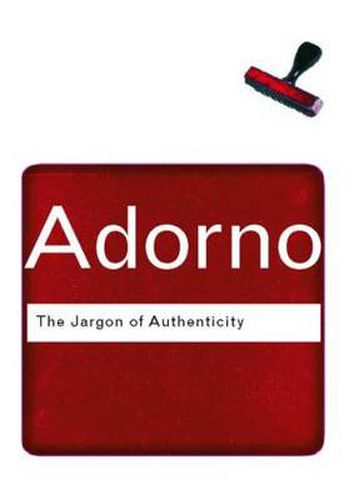Readings Newsletter
Become a Readings Member to make your shopping experience even easier.
Sign in or sign up for free!
You’re not far away from qualifying for FREE standard shipping within Australia
You’ve qualified for FREE standard shipping within Australia
The cart is loading…






Theodor Adorno was no stranger to controversy. In The Jargon of Authenticity he gives full expression to his hostility to the language employed by certain existentialist thinkers such as Martin Heidegger. With his customary alertness to the uses and abuses of language, he calls into question the jargon, or ‘aura’, as his colleague Walter Benjamin described it, which clouded existentialists’ thought. He argued that its use undermined the very message for meaning and liberation that it sought to make authentic. Moreover, such language - claiming to address the issue of freedom - signally failed to reveal the lack of freedom inherent in the capitalist context in which it was written. Instead, along with the jargon of the advertising jingle, it attributed value to the satisfaction of immediate desire. Alerting his readers to the connection between ideology and language, Adorno’s frank and open challenge to directness, and the avoidance of language that ‘gives itself over either to the market, to balderdash, or to the predominating vulgarity’, is as timely today as it ever has been.
$9.00 standard shipping within Australia
FREE standard shipping within Australia for orders over $100.00
Express & International shipping calculated at checkout
Theodor Adorno was no stranger to controversy. In The Jargon of Authenticity he gives full expression to his hostility to the language employed by certain existentialist thinkers such as Martin Heidegger. With his customary alertness to the uses and abuses of language, he calls into question the jargon, or ‘aura’, as his colleague Walter Benjamin described it, which clouded existentialists’ thought. He argued that its use undermined the very message for meaning and liberation that it sought to make authentic. Moreover, such language - claiming to address the issue of freedom - signally failed to reveal the lack of freedom inherent in the capitalist context in which it was written. Instead, along with the jargon of the advertising jingle, it attributed value to the satisfaction of immediate desire. Alerting his readers to the connection between ideology and language, Adorno’s frank and open challenge to directness, and the avoidance of language that ‘gives itself over either to the market, to balderdash, or to the predominating vulgarity’, is as timely today as it ever has been.